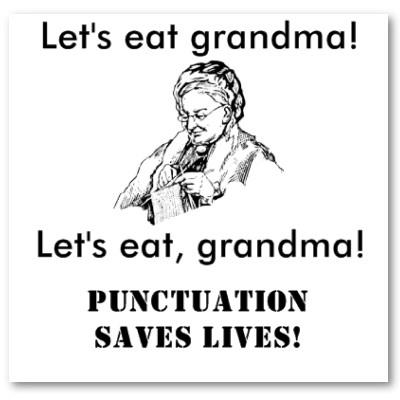Punctuation Makes the Difference! Posted by Gabriele on Apr 5, 2012 in English Grammar
 I recently saw the above joke floating around* Facebook and it of course got me thinking about punctuation. In a previous post I addressed the names of punctuation marks in English, but I did not discuss their usage. So, that is what we will be covering today! Punctuation marks constitute the system of symbols that we use to separate sentences and parts of sentences, in order to make their meaning clear. All of these symbols together are called ‘punctuation marks’. Below is a list of their individual names and how to use these punctuation marks correctly.
I recently saw the above joke floating around* Facebook and it of course got me thinking about punctuation. In a previous post I addressed the names of punctuation marks in English, but I did not discuss their usage. So, that is what we will be covering today! Punctuation marks constitute the system of symbols that we use to separate sentences and parts of sentences, in order to make their meaning clear. All of these symbols together are called ‘punctuation marks’. Below is a list of their individual names and how to use these punctuation marks correctly.
| Period | . |
|
| Comma | , |
|
| Question mark | ? |
|
| Exclamation mark | ! |
|
| Semi-colon | ; |
|
| Colon | : |
|
Okay, after this brief overview, let us get back to the picture above. So, what do these two different sentences mean?
Let’s eat grandma! = We should eat grandma. or Why don’t we eat grandma?
Let’s eat, grandma! = Grandma, let’s go eat together. or Come on grandma it’s time to eat.
Like I said, punctuation really does make a difference!
* floating around = used in slang for this means ‘moving around’ or ‘present on’

Build vocabulary, practice pronunciation, and more with Transparent Language Online. Available anytime, anywhere, on any device.
About the Author: Gabriele
Hi there! I am one of Transparent Language's ESL bloggers. I am a 32-year-old native English speaker who was born and raised in the United States. I am living in Washington, DC now, but I have lived all over the US and also spent many years living and working abroad. I started teaching English as a second language in 2005 after completing a Master's in Applied Linguists and a Certificate in English Language Teaching to Adults' (CELTA). Since that time I have taught ESL in the United States at the community college and university level. I have also gone on to pursue my doctorate in psychology and now I also teach courses in psychology. I like to stay connected to ESL learners around the world through Transparent Languages ESL Blog. Please ask questions and leave comments on the blog and I will be sure to answer them.



